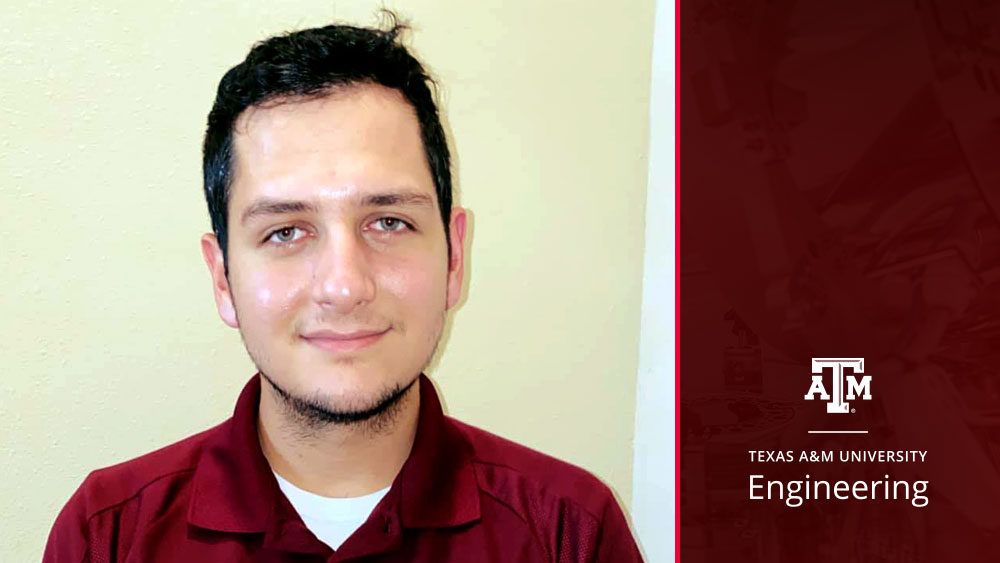
Brent Vela ’20 has received the National Science Foundation’s Graduate Research Fellowship. His current research focuses the development of artificial intelligence-enabled frameworks capable of optimally designing experiments based on all information currently known, including experiment, simulation and expert opinion. |
Image: Texas A&M Engineering
Brent Vela ‘20, a graduate student in the Department of Materials Science and Engineering at Texas A&M University, has received the prestigious National Science Foundation’s (NSF) Graduate Research Fellowship (GRFP).
Vela received his bachelor’s degree in chemical engineering from Texas A&M and is currently a doctoral student under the direction of materials science and engineering professor Dr. Raymundo Arróyave. Vela’s exposure to Bayesian statistics in a safety engineering course led him to Arróyave’s lab, where researchers use Bayesian inference in materials science and design.
Vela’s current research focuses on the development of artificial intelligence-enabled frameworks capable of optimally designing experiments based on all information currently known, including experiment, simulation and expert opinion. The framework is being deployed on a project where they are designing high-entropy alloys for jet turbine blade applications.
“It is like searching for a needle in a multidimensional haystack,” said Vela.
Vela works with Arróyave to realize the computational aspects of the framework, as well as with Dr. Ibrahim Karaman, department head, and his students to incorporate expert opinion and experimental measurements into the framework.
Vela said he was pleased to get the award for his research. “No man is an island. I am thankful to all my mentors, past and present,” he said. “I am grateful to the people who gave me a strong foundation and the opportunity to even pursue higher education.”
“Brent is a brilliant student who is an essential member of our team as we try to solve an extremely hard problem,” said Arróyave. “I am really lucky to have him as my student, and I am sure he will achieve great things in the future as he pioneers these new methods to accelerate the discovery of materials.”
The NSF GRFP recognizes and supports outstanding graduate students in NSF-supported STEM disciplines who are pursuing research-based master’s and doctoral degrees at accredited U.S. institutions. The five-year fellowship includes three years of financial support, including an annual stipend of $34,000 and a cost of education allowance of $12,000 to the institution.
Vela received his bachelor’s degree in chemical engineering from Texas A&M and is currently a doctoral student under the direction of materials science and engineering professor Dr. Raymundo Arróyave. Vela’s exposure to Bayesian statistics in a safety engineering course led him to Arróyave’s lab, where researchers use Bayesian inference in materials science and design.
Vela’s current research focuses on the development of artificial intelligence-enabled frameworks capable of optimally designing experiments based on all information currently known, including experiment, simulation and expert opinion. The framework is being deployed on a project where they are designing high-entropy alloys for jet turbine blade applications.
“It is like searching for a needle in a multidimensional haystack,” said Vela.
Vela works with Arróyave to realize the computational aspects of the framework, as well as with Dr. Ibrahim Karaman, department head, and his students to incorporate expert opinion and experimental measurements into the framework.
Vela said he was pleased to get the award for his research. “No man is an island. I am thankful to all my mentors, past and present,” he said. “I am grateful to the people who gave me a strong foundation and the opportunity to even pursue higher education.”
“Brent is a brilliant student who is an essential member of our team as we try to solve an extremely hard problem,” said Arróyave. “I am really lucky to have him as my student, and I am sure he will achieve great things in the future as he pioneers these new methods to accelerate the discovery of materials.”
The NSF GRFP recognizes and supports outstanding graduate students in NSF-supported STEM disciplines who are pursuing research-based master’s and doctoral degrees at accredited U.S. institutions. The five-year fellowship includes three years of financial support, including an annual stipend of $34,000 and a cost of education allowance of $12,000 to the institution.